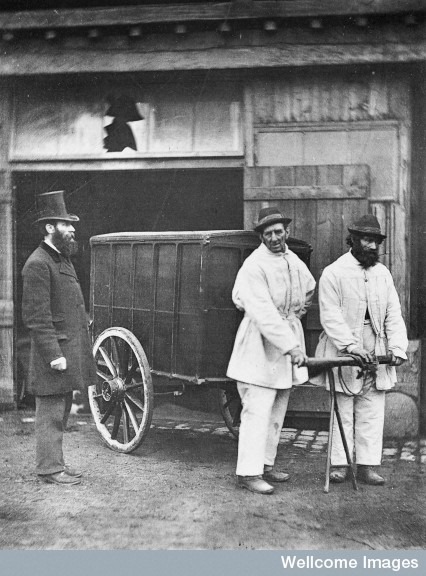Every semester, department faculty and postdocs teach a range of classes in the Krieger School of Arts and Sciences on the Homewood campus, as part of the undergraduate major and minor in the History of Science, Medicine, and Technology. The requirements for this degree are here.
The Integrated Student Information System (ISIS) is Johns Hopkins’ university-wide, web-based student information system. You will also find complete descriptions of courses in the Office of the Registrar’s course schedule, in the History of Science and Technology section.
If you want to know more about undergraduate classes taught by our graduate students, please see details about the Dean’s Teaching Fellowships.
Yearly Courses
AS.140.105 History of Medicine
3.00 credits. (Usually every Fall semester)
Course provides an overview of the medical traditions of six ancient cultures; the development of Greek and Islamic traditions in Europe; and the reform and displacement of the Classical traditions during the Scientific Revolution.
AS.140.106 History of Modern Medicine
3.00 credits. (Usually every Spring semester)
The history of Western medicine from the Enlightenment to the present, with emphasis on ideas, science, practices, practitioners, and institutions, and the relationship of these to the broad social context.
Courses Offered Upon Availability
AS.140.146 History of Public Health in East Asia
This course examines the history of disease, epidemics, and public health responses in East Asia from the 17th-20th centuries. This public health history emphasizes the interactions, connections, and comparisons among China, Japan, Korea, and Taiwan.
AS.140.156 Harm City? Public Health in Baltimore, 1797 to the present
Explores the history of public health in urban America using Baltimore as example. Examines topics such as include infectious diseases, mental health, sanitation, rodent control, primary care, substance abuse, and STDs using frameworks of racism, classism, poverty and inequality.
AS.140.176 Public Health in East Asia Through Films & Documentaries
This course uses contemporary films and documentaries to address issues in public health in East Asia, past & present. Topics covered include medicine in turn-of-the-twentieth century Japan and China, revolutionary medicine, STDS, mental illness, HIV/AIDs in China, industrial pollution, the politics of universal health care insurance, and pandemics in East Asia.
AS.140.227 Race, Racism and Medicine
How can we think about the interconnections between racism, theories of race and the practice of medicine? Living at a moment when racial disparities in health outcomes in the United States are still very stark, this course will provide a historically grounded approach to thinking about the roles that race and racism have played in healthcare, the production of health disparities as well as the role of medicine in the development of racist thought. While much of this course will focus geographically within the United States, this class will also explore global histories of medicine, encountering questions of race and medicine in Africa, the South Pacific and Asia. In addition to the analysis of primary source documents and historical texts, students will also be introduced to theoretical approaches to the study of race and racism from W.E.B. Dubois, Sylvia Wynter, Frantz Fanon and others.
AS.140.231 Health & Society in Latin America & the Caribbean
Healthcare is complex in Latin America and the Caribbean, where many people supplement biomedicine with plant and diet-based remedies, as well as religious and shamanic services. This course will cover the history of health and society in Latin America and the Caribbean from 1750 to the present, covering such topics as: medicine and the Spanish inquisition; disease control and tropical medicine; the medical knowledge of enslaved and indigenous peoples; reproduction and nation-state formation; and healthcare during the Cold War and its aftermath. Throughout, we will also consider the ways in which ideas about race, gender, indigeneity, class, and disability have affected people’s access to healthcare. By the end of the course we will understand why leading scholars have referred to Latin America and the Caribbean as a “laboratory” for the production of medical knowledge. We will discover how that knowledge has been influenced by common people as well as professionals, and how it has influenced medical practice around the world. This is a discussion-based seminar course. It does not assume any previous knowledge of the history of medicine or Latin American and Caribbean history.
AS.140.346 History of Chinese Medicine
Students will study the most recent anthropological, philosophical, and historical scholarship on medicine in traditional and modern Chinese society. They will approach the topic from several angles including medical pluralism, the range of healers, domestic and literate medicine, gender, emergence of new disciplines, public health and the history of disease. The course relies on secondary sources and primary sources in English translation. Cross-listed with East Asian Studies.
AS.140.347 History Of Genetics
Intellectual and social history of the gene concept, including Mendelism, eugenics, medical genetics, DNA, genomics, and personalized medicine.
AS.140.394 Heredity, Eugenics, and Society
In this course, we will examine the ways in which concepts of the gene, heredity, and innateness have both shaped and been shaped by society over the last two-plus centuries. Topics under discussion may include: eugenics, biological determinism, scientific racism, human breeding programs, genetics and gender, genetics and intelligence, genetic engineering including CRISPR, assisted reproductive technologies, sociogenomics, and polygenic risk scores.
AS.140.435 Ways of Knowing: New Histories of Science, Medicine, and Technology
What does it mean for science to have a history? Comparing newer approaches with classic works, we will explore different strategies for placing science, medicine, and technology in social context.
